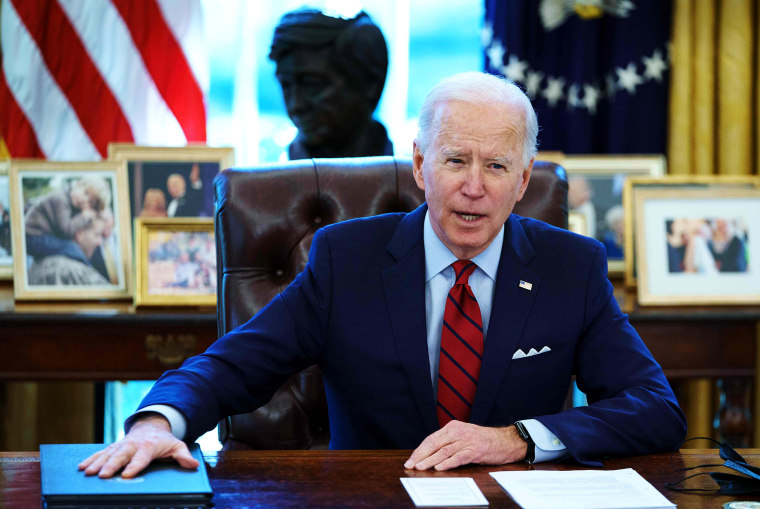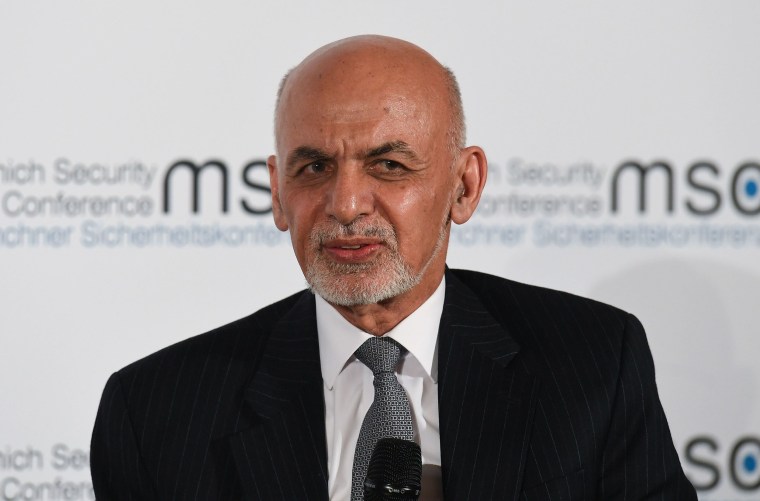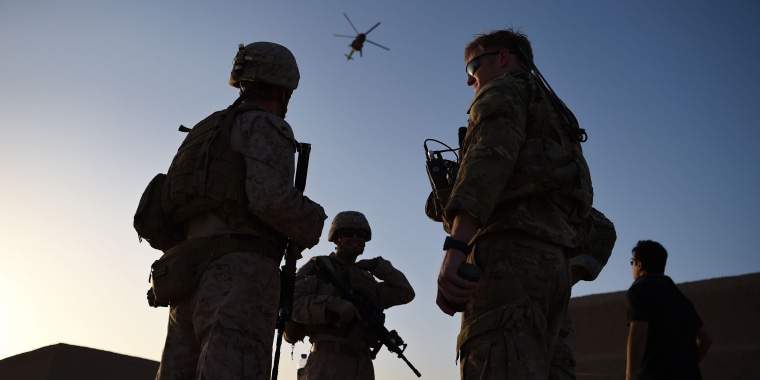WASHINGTON — President Joe Biden is signaling a tougher line with the Taliban than his predecessor, with top officials warning that a planned U.S. troop withdrawal from Afghanistan in May could be delayed if the insurgents fail to live up to their promises.
A flurry of statements and comments from the White House, State Department and Pentagon this week left no doubt that the Biden administration had a skeptical view of a shaky peace process launched by former President Donald Trump and the Taliban's willingness to sever ties with Al Qaeda and other extremists.
The administration, which said it was carrying out a review of the situation in Afghanistan, faces a series of difficult choices that will force officials to weigh the risk of a Taliban takeover. Any delay in a U.S. troop pull-out could trigger an escalation of violence and prompt the Taliban to abandon peace negotiations with its adversaries in the Kabul government, former U.S. officials and military officers say.
Biden's national security adviser, Jake Sullivan, said on Friday that the administration is "taking a hard look at the extent to which the Taliban are in fact complying" with provisions of a U.S.-Taliban deal signed last year.
The February 2020 agreement called for the withdrawal of U.S.-led troops by May 2021 in return for the Taliban breaking with terrorist groups, sharply reducing violence and entering into peace negotiations with the Afghan government.
Pentagon Press Secretary John Kirby said on Thursday the Taliban were failing to abide by their pledges under the deal, which was supposed to open the door to a peace settlement between the insurgents and the U.S.-backed Kabul government.

"Without them meeting their commitments to renounce terrorism and to stop the violent attacks against the Afghan National Security Forces, it's very hard to see a specific way forward for the negotiated settlement," said Kirby. "But we're still committed to that."
In another break with the former administration, Biden's team also has made a point of underscoring the importance of human rights and women's rights in Afghanistan. The Taliban, known for their draconian rule and repression of Afghan women during their reign from 1996-2001, made no pledges on the status of women in their agreement with the United States.
In his call with Afghan President Ashraf Ghani, Biden's top diplomat, Antony Blinken, said any peace settlement needed to preserve "the progress made over the last 20 years with regard to human rights, civil liberties, and the role of women in Afghan society."
The shift in tone was welcomed by the Afghan government, which had complained it was shut out of the negotiations between Washington and the Taliban. President Ashraf Ghani said on Friday he was heartened by the new team's approach and what he called its "early, focused, systematic attention."
Although the Biden administration indicated it was prepared to put the brakes on withdrawal plans if necessary, it has chosen to retain Trump's peace envoy to Afghanistan, Zalmay Khalilzad, at least for the time being.
Khalilzad, the architect of the U.S.-Taliban agreement, has strained relations with the Ghani government. But President Ghani suggested Khalilzad would be working for a new U.S. president, with a more coordinated, predictable approach.

"Now Ambassador Khalilzad will be reporting to a very organized decision-making process," Ghani said at a virtual event Friday organized by the Aspen Institute think tank.
"We have two very different functions. I represent the people of Afghanistan. He is an employee of the U.S. government," the Afghan president told Carol Lee of NBC News, who hosted the session.
Ghani added that he and the Afghan-born Khalilzad are old classmates and "we go back a long way."
Both men studied at the American University in Beirut and also crossed paths later in the United States.
The Afghan-born U.S. diplomat, Khalilzad, faced a difficult mission as he sought to persuade the Taliban to agree to peace talks with their foes while his boss, former President Trump, blindsided him with tweets about pulling U.S. troops out of the country ahead of schedule.
Khalilzad's first job could be to convey to the Taliban that there was no guarantee U.S. and NATO troops would leave the country by May unless the insurgents showed they were delivering on their end of the bargain, former U.S. officials and military officers said.
The Americans will have to persuade the Taliban that the deal is still alive, even if a troop withdrawal is put off beyond the spring, one former U.S. official said.
"On the Taliban side, if there's to be a delay, it's pretty important to get some kind of tacit agreement with them early because it doesn't help anyone if they pull out of the agreement entirely," said a former U.S. official with experience in Afghanistan. "They are going to need time to sell it to their fighters."
Biden, however, has only limited leverage over the Taliban after Trump withdrew the bulk of American troops in his last year in office. It would have been easier to push the Taliban for results if the U.S. could have linked incremental reduction in troops to concessions from the insurgents, the former official said.
Postponing a U.S. withdrawal indefinitely could risk derailing the entire peace process, and the Taliban could revert to an all-out war footing, resuming attacks on U.S. forces, former officials said.
"The options they're facing obviously are very tough," said the former official.
There are now roughly 2,500 U.S. troops in Afghanistan, and more than 7,000 NATO-led forces on the ground. A year ago, there were 12,000 U.S. troops deployed to the country, a number that had dropped to about 8,600 in July.
When NATO defense ministers meet in February, the Biden administration's stance on Afghanistan will likely be at the top of the agenda. As U.S. troop levels plunged in recent months, NATO Secretary General Jens Stoltenberg had warned that "leaving too soon or in an uncoordinated way" carried serious risks, possibly allowing the country to become a sanctuary again for terrorist groups.
Retired U.S. Gen. John Allen, who served as commander of U.S. and NATO forces in Afghanistan from 2011 to 2013, said European allies with troops in Afghanistan would likely be open to a delay in a troop drawdown.
"My guess would be that if the U.S. wanted to slow down, they (NATO) would slow down" the pace of withdrawal as well, Allen said.
Download the NBC News app for breaking news and politics
"The president could make the case that the Taliban are in material breach of the agreement," said Allen, an outspoken critic of the U.S.-Taliban deal.
A United Nations report in May concluded that the Taliban have retained close links to Al Qaeda and sought its advice during negotiations with U.S. officials.
Al Qaeda, which carried out the Sept. 11, 2001 attacks on the U.S., continues to operate in 12 provinces of Afghanistan, with 400 to 600 operatives and a training camp in the eastern part of the country, according to the report issued to the U.N. Security Council.
The Treasury Department recently found that "Al Qaeda is gaining strength in Afghanistan while continuing to operate with the Taliban under the Taliban's protection," according to a Jan. 6 memo to the Defense Department's inspector general.
The Taliban quickly rejected the Treasury Department's account and alleged all the terror group's fighters have left Afghanistan. "The report has been compiled by partisan and warmongering circles based on false information," Taliban spokesman Zabihullah Mujahid said.
A Taliban leader who led the negotiations last year with the Trump administration said on Friday that the insurgency was offering "safe passage" for U.S. troops leaving Afghanistan.
"In the history of Afghanistan, no one ever gave a safe passage to foreign invading troops. So, this is a good chance for the Americans that we are giving them safe passage to go out according to this treaty. We hope that when they are reviewing it they will come to the same positive [conclusion]," Sher Mohammad Abbas Stanikzai, deputy Taliban peace negotiator, said Friday during a visit to Moscow.


